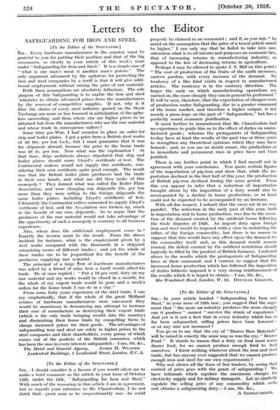[To the Editor of the SPECTATOR.] SIR,—I should consider it
a favour if you would allow me to make a brief comment on the article in your issue of October 13th, under the title, " Safeguarding for Iron and Steel."
With much of the reasoning in this article I am in agreement, but as regards your reference to Mr. Chamberlain, I do not think that—great man as he unquestionably was--he could properly be claimed as an economist ; and if, as you say, " he acted on the assumption that the price of a taxed article would
be higher," I can only say that he failed to take into con- sideration what is to all intents and purposes an economic law, that of increasing returns in manufacturing industry, as opposed to the law of decreasing returns in agriculture.
Perhaps I may be allowed to quote J. S. Mill on this point : " The cost of production of the fruits of the earth increases, caeteris paribus, with every increase of the demand. No
tendency of a like kind exists in respect to manufactured articles. The tendency is in the contrary direction. The larger the scale on which manufacturing operations are carried on, the more cheaply they can in general be performed." It will be seen, therefore, that the expectation of cheaper costs of production under Safeguarding, due to a greater command of the home market, and therefore a higher output, is not merely a pious hope on the part of " Safeguarders," but has a perfectly sound economic justification.
It must further be remembered that Mr. Chamberlain had no experience to guide him as to the effect of duties on manu- factured goods ; whereas the protagonists of Safeguarding to-day have at least the results of the past two or three years to strengthen any theoretical opinions which they may have formed ; and, as you are no doubt aware, the predictions as to immediate and permanent rises in price have not been justified.
There is one further point in which I find myself not in agreement with your conclusions. You quote certain figures of the importation of pig-iron and show that, while the im- portation declined in the first half of this year, the production of British pig-iron declined during the same period. From this you appear to infer that a reduction of importation brought about by the imposition of a duty would also be accompanied by a decline in home production, or at least could not be expected to be accompanied by an increase.
With all due respect, I submit that the cases are in no way parallel. The reduction in the early part of this year, both in importation and in home production, was due to the cessa- tion of the demand created by the artificial boom following the trade disputes of 1926. An import duty upon foreign iron and steel would be imposed with a view to restricting the influx of the foreign commodity, but there is no reason to suppose that this would have any effect upon the demand for the commodity itself, and, as this demand would remain normal, the deficit created by the artificial restriction should logically be filled by the product of British furnaces. I referred above to the results which the protagonists of Safeguarding have at their command, and I venture to suggest that the increased home production which has followed the imposition of duties hitherto imposed is a very strong reinforcement of the results which it is hoped to obtain.—I am, Sir, &c., 30a Woodstock Road, London, W. 12. DOUGLAS GRAHAM.






























































 Previous page
Previous page